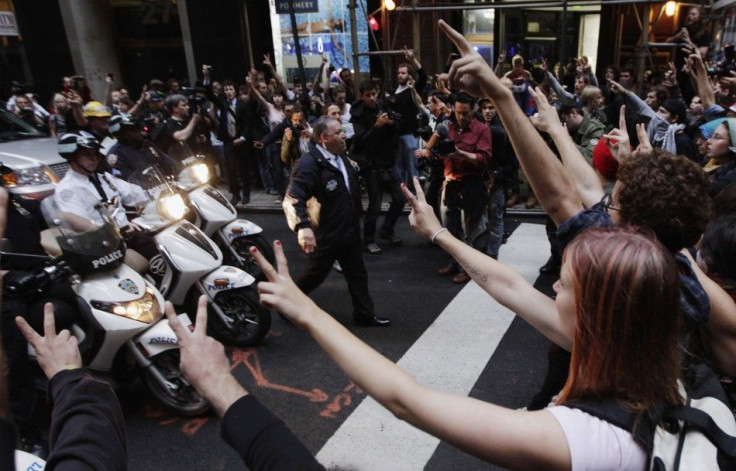As Occupy Wall Street Expands, Tensions Mount Over Structure

From the beginning, Occupy Wall Street has been committed to direct democracy. Anyone can participate in the General Assembly, the movement's main decision making body, by offering ideas or questioning other peoples' proposals.
But that model is coming under strain as the still-nascent movement becomes more organized and maps a way forward. The last few weeks have seen a proliferation of working groups devoted to tasks that include managing food and supplies, coordinating community outreach and overseeing nearly $500,000 in donations.
As the movement becomes larger and its structure grows more complex, protesters are debating ways to reform the General Assembly, which many veteran protesters say has become too unwieldy.
People are extremely frustrated with the process and how it is now, said protester Ronny Nunez. The General Assemblies are great, they offer the ability for anyone to speak out, but there comes a point in which you have so many people involved in the process that it loses any sort of effectiveness.
Nunez cited a recent General Assembly in which members of the sanitation working group sought emergency funding to purchase trash bins. Deliberations dragged on as people offered amendments, including a requirement that the protesters purchase their supplies secondhand, that made it effectively impossible to get the funding they needed, Nunez said.
We're going through all these different growing pains where we're learning, and we're learning that some things work on a smaller level and some on a bigger level, Nunez said.
Spokes Council
Protesters are circulating a proposal to streamline the process with something called a Spokes Council. Under that model, the various working groups would nominate representatives to participate in the General Assembly on their behalf. The spokesperson would rotate, and during the General Assembly they would periodically conferring with their respective working groups, which would be seated behind them. The idea has already been blocked once in the General Assembly, but is set to come up again.
A protester arrived at a recent meeting of the Outreach working group to explain the proposal. The current format had become untenable, he argued. He noted that under the Spokes Council, anyone can join a working group and thereby have a say.
I think that's bulls-t, another protester responded, arguing that the idea endangered the movement's inclusiveness.
In participatory democracy, the protester presenting the idea shot back, as long as you allow access at all times you've done your bit.
Marisa Holmes, who on Monday night explained the Spokes Council idea during a meeting of the Structure working group, argued that the idea encouraged people to become more deeply invested in Occupy Wall Street by having them join working groups that are essential to the movement's day-to-day operations. Hours-long meetings where people debate the logistics of laundry, Holmes said, can vitiate the process by leading working groups to avoid the General Assembly altogether.
The General Assembly has been an amazing body for movement building, and it enables people to have a voice for what is sometimes the first time, Holmes said. We don't want to destroy it but we see that there's a lot of work done in a not always accountable and transparent way.
Dilemma: Preserve Participatory Structure or Become More-Efficient?
The tension between people who want to preserve the movement's initial qualities and those who want to make it more efficient reflects an overlapping but different set of goals, said Todd Gitlin, a professor of journalism and communications at Columbia University who observed the evolution of an activist movement as president of Students for a Democratic Society. He said the movement will need to find a way to accommodate the purists and pragmatists, or those for whom the very participation is the goal and those whose goals have to do with moving the world.
You can think of this as the process by which a nation-state is formed, Gitlin said. At one point anyone who shows up is a member, and then at another point those who have been members and have an appreciation for tasks to be done say 'wait a minute, we need to capitalize on our experience and value our continuity'... You're talking about the founding of some kind of functioning democracy, and the rules continue to evolve in nation-states, too.
As that process unfolds, observers and members of the movement worry about the movement becoming fractured or co-opted.
My fundamental question is why would anyone in this movement, which is pro-democracy and pro-consensus, repeatedly bring up a proposal after it was already blocked, which is very divisive? asked Etan Ben-Ami, a licensed social worker who is skeptical of the Spokes Council idea. On the left we always have to guard what's occurred in the past frequently: takeovers by the vanguard left that infiltrates the process and pushes an agenda.
On Monday night, Edward Ledford sat by the Structure working group, listening intently as Holmes explained the Spokes Council idea. Ledford, 61, had traveled from Lincoln, Nebraska armed with a plan, based on an obscure academic paper by a mathematician, for a series of deliberative juries that flow into a parliamentary body. Ledford spoke eloquently of the challenges Occupy Wall Street faces, repeatedly referencing James Madison's Federalist Paper No. 10, which warned presciently against the danger factionalism poses to democracy.
People do not seem to have learned their history. I see a very classical historical error unfolding, Ledford said, adding that he had seen several red flags in less than a day. The movement has to be structured, but if it's structured in a bad way it is going to fail. Direct participatory democracy has in every instance, once it takes hold of a national institution, basically destroyed it because of its propensity to succumb to the violence of faction.
You can contact the reporter at j.white@ibtimes.com
© Copyright IBTimes 2025. All rights reserved.




















